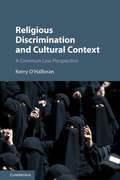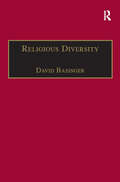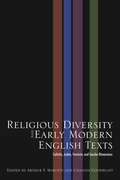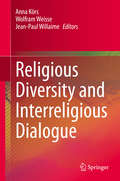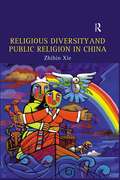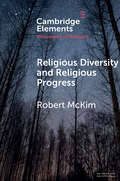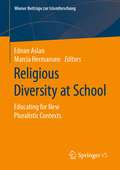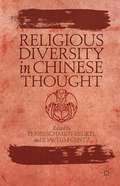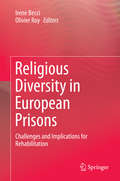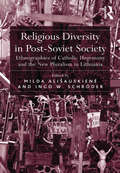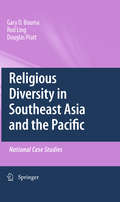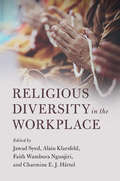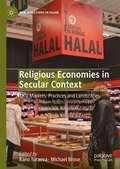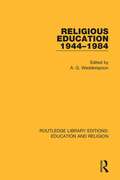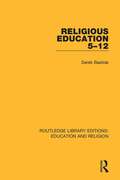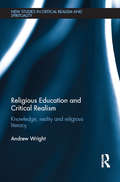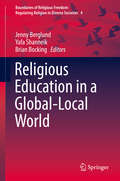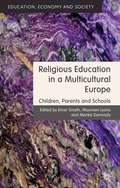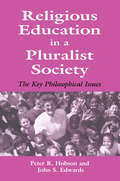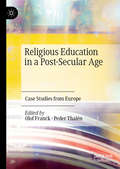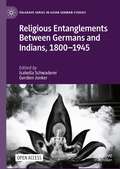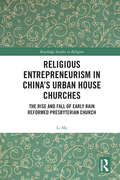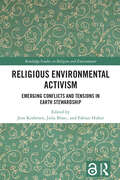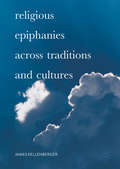- Table View
- List View
Religious Discrimination and Cultural Context: A Common Law Perspective
by Kerry O'HalloranGenerations of festering culture wars, compounded by actual wars in predominantly Muslim countries, the terrorism of Isis, and the ongoing migrant crisis have all combined to make religious discrimination the most pressing challenge now facing many governments. For the leading common law nations, with their shared Christian cultural heritage balanced by a growing secularism, the threat presented by this toxic mix has the potential to destabilise civil society. This book suggests that the instances of religious discrimination, as currently legally defined, are constrained by that cultural context, exacerbated by a policy of multiculturalism, and in practice, conflated with racial, ethnic or other forms of discrimination. Kerry O'Halloran argues that many culture war issues - such as those that surround the pro-choice/pro-life debate and the rights of the LGBT community - can be viewed as rooted in the same Christian morality that underpins the law relating to religious discrimination. Suggests that present forms of religious discrimination are shaped by past cultural traditions. Demonstrates how many culture war issues - such as abortion and gay marriage - are forms of religious discrimination. Provides a comparative analysis of religious discrimination case law which shows how judicial treatment of matters such as accommodating religious belief in the workplace varies on a jurisdictional basis.
Religious Diversity: A Philosophical Assessment (Routledge Philosophy of Religion Series)
by David BasingerReligious diversity exists whenever seemingly sincere, knowledgeable individuals hold incompatible beliefs on the same religious issue. Diversity of this sort is pervasive, existing not only across basic theistic systems but also within these theistic systems themselves. Religious Diversity explores the breadth and significance of such conflict. Examining the beliefs of various theistic systems, particularly within Christianity, Judaism, Hinduism and Buddhism, Basinger discusses seemingly incompatible claims about many religious issues, including the nature of God and the salvation of humankind. He considers particularly the work of Hick, Gellman, Plantinga, Schellenberg, Alston, Wainwright, and Quinn, applying their perspectives on 'exclusivism' and 'pluralism' as they become relevant to the issues in question. Basinger's survey of the relevant literature, proposed solutions, and fresh insights offer an invaluable contribution not only for philosophers of religion and philosophical theologians but for anyone interested in the increasingly significant question of what a religious believer can or cannot justifiably say about their religious perspective.
Religious Diversity
by Roger TriggShould we merely celebrate diversity in the sphere of religion? What of the social cohesion of a country? There is a constant tug between belief in religious truth and the need for respect for other religions. Religious Diversity: Philosophical and Political Dimensions examines how far a firm faith can allow for toleration of difference and respect the need for religious freedom. It elucidates the philosophical credentials of different approaches to truth in religion, ranging from a dogmatic fundamentalism to a pluralism that shades into relativism. Must we resort to a secularism that treats all religion as a personal and private matter, with nothing to contribute to discussions about the common good? How should law approach the issue of religious freedom? Introducing the relevance of central discussions in modern philosophy of religion, the book goes on to examine the political implications of increasing religious diversity in a democracy.
Religious Diversity and Early Modern English Texts: Catholic, Judaic, Feminist, and Secular Dimensions
by Arthur F. Marotti Chanita GoodblattIn Religious Diversity and Early Modern English Texts: Catholic, Judaic, Feminist, and Secular Dimensions, editors Arthur F. Marotti and Chanita Goodblatt present thirteen essays that examine the complex religious culture of early modern England. Emphasizing particularly the marginalized discourses of Catholicism and Judaism in mainstream English Protestant culture, the authors highlight the instability of an official religious order that was troubled not only by religious heterodoxy but also by feminist and secular challenges. North American and Israeli scholars present essays on a wide range of subjects all assumed to be "marginal" but which in a real sense were central to the religious and cultural life of the Protestant English nation. Using critical methods ranging from historical analysis, deconstruction, feminist inquiry, and intertextual interpretation to pedagogical experimentation, contributors offer analyses in five sections: Minority Catholic Culture, Figuring the Jew, Hebraism and the Bible, Women and Religion, and Religion and Secularization. Essays reveal new aspects of familiar texts such as Shakespeare's King Lear and The Merchant of Venice, the psalm translations by Sir Philip Sidney and the Countess of Pembroke, Christopher Marlowe's dramas, George Herbert's poetry, Aemelia Lanyer's Salve Deus Rex Judaeorum, and John Milton's Samson Agonistes. They also call attention to works such as the mid-sixteenth-century play The Historie of Jacob and Esau, William Blundell's Catholic antiquarian writing, the series of paintings portraying the religious institute of Mary Ward, and funeral sermons for religiously active women. Contributors show that we cannot understand a culture without attending to its repressed, marginalized, and unacknowledged elements. Scholars of religious, literary, and cultural history will enjoy this illuminating collection.
Religious Diversity and Interreligious Dialogue
by Anna Körs Wolfram Weisse Jean-Paul WillaimeThis edited volume offers solutions on the challenges of religious pluralisation from a European perspective. It gives special attention to interreligious dialogue and interfaith relations as specific means of dealing with plurality. In particular, the contributors describe innovative scientific approaches and broad political and social scopes of action for addressing the diversity of beliefs, practices, and traditions. In total, more than 25 essays bring together interdisciplinary and international research perspectives. The papers cover a wide thematic range. They highlight how religious pluralisation effects such fields as theology, politics, civil society, education, and communication/media. The contributors not only illustrate academic debates about religious diversity but they also look at the political and social scope for dealing with such. Coverage spans numerous countries, and beliefs, from Buddhism to Judaism. This book features presentations from the Herrenhausen Conference on "Religious Pluralisation - A Challenge for Modern Societies," held in Hanover, Germany, October 2016. This insightful collection will benefit students and researchers with an interest in religion and laicism, interreligious dialogue, governance of religious diversity, and religion in the public sphere.
Religious Diversity and Public Religion in China
by Zhibin XieThis book addresses the issue of public religion and its implications in Chinese society. Zhibin Xie explores various normative considerations concerning the appropriate role of religion in public political life in a democratic culture. Besides drawing on the theoretical discourse on religion in the public sphere from Western academics, it holds that the issue of religion in Chinese politics should be addressed by paying attention to characteristics of religious diversity and its political context in China. This leads to a position of "liberal-constrained public religion" in China, which encourages religious contribution to the public sphere as a substantial component of religious liberty in China on the one hand and proposes some constraints both upon government and religions for regulating religious political discourse on the other.
Religious Diversity and Religious Progress (Elements in the Philosophy of Religion)
by Robert McKimWhat is someone who has a perspective on religious matters to say about those who endorse other perspectives? What should they say about other religions? For example, might some of their beliefs be true? What stage are we human beings at in our religious development? Are we close to maturity, religiously speaking, so that most of the important religious ideas and innovations there will ever be have already appeared? Or are we starting out in our religious evolution, so that religious developments to date are merely the first rude efforts of a species in its religious infancy?
Religious Diversity at School: Educating for New Pluralistic Contexts (Wiener Beiträge zur Islamforschung)
by Ednan Aslan Marcia HermansenThis volume features chapters by international experts in education, sociology, and theology who consider a range of challenges faced by educators in primary and secondary schools that are becoming increasingly diverse in terms of the ethnic and religious backgrounds of pupils. From the non-religious, to the refugee, to student fundamentalism and even radicalization—these multiple, fresh approaches analyze the dynamics of the changing pedagogical landscape in an age of ever increasing globalization and cultural plurality. Today’s classrooms are often the most crucial spaces where children and adolescents encounter new cultural, religious, and other worldviews. Increasingly, teachers are called on to empower their pupils with the tools and competencies necessary to reflect on and process this plurality in ways that are productive for their intellectual growth and moral maturation. Regional case studies provide extensive data while offering insights into developments in school settings across Europe, in Turkey, and in the United States. In addition, a number of the contributions address the delivery, content, and policies of Islamic Religious Education in European contexts, the educational strategies employed in multi-religious societies, and interreligious dialogue in schools, whether intentional or spontaneous.
Religious Diversity In Chinese Thought
by Perry Schmidt-Leukel Joachim GentzThis collection of essays by major scholars analyze the religious diversity in Chinese religion, bringing together topics from traditional and contemporary contexts and Chinese religions' encounters with Western religion.
Religious Diversity in European Prisons
by Irene Becci Olivier RoyThis book examines how prisons meet challenges of religious diversity, in an era of increasing multiculturalism and globalization. Social scientists studying corrections have noted the important role that religious or spiritual practice can have on rehabilitation, particularly for inmates with coping with stress, mental health and substance abuse issues. In the past, the historical figure of the prison chaplain operated primarily in a Christian context, following primarily a Christian model. Increasingly, prison populations (inmates as well as employees) display diversity in their ethnic, cultural, religious and geographic backgrounds. As public institutions, prisons are compelled to uphold the human rights of their inmates, including religious freedom. Prisons face challenges in approaching religious plurality and secularism, and maintaining prisoners' legal rights to religious freedom. The contributions to this work present case studies that examine how prisons throughout Europe have approached challenges of religious diversity. Featuring contributions from the UK, France, Italy, Germany, Switzerland, The Netherlands, Belgium and Spain, this interdisciplinary volume includes contributions from social and political scientists, religion scholars and philosophers examining the role of religion and religious diversity in prison rehabilitation. It will be of interest to researchers in Criminology and Criminal Justice, Social and Political Science, Human Rights, Public Policy, and Religious Studies.
Religious Diversity in Post-Soviet Society: Ethnographies of Catholic Hegemony and the New Pluralism in Lithuania
by Ingo W. Schröder Milda AlišauskieneSince the end of state repression against religion, two major processes have taken place in the formerly socialist countries: historically dominant churches strive to reassert their position in society, while new religious groups and ideas from various parts of the world are proliferating. This generates pluralism of religious communities and individual religious attitudes. Religious Diversity in Post-Soviet Society presents the first collection of ethnographies of this new religious diversity for Lithuania, a country that has a long history of a dominant Catholic Church. The authors reveal how Catholicism has become increasingly diversified and other religions (Charismatic Protestantism, Baltic Paganism, Eastern religions and other alternative spiritualities) are claiming their space in the religious field.
Religious Diversity in Southeast Asia and the Pacific
by Gary D. Bouma Rodney Ling Douglas PrattReligious diversity is now a social fact in most countries of the world. While reports of the impact of religious diversity on Europe and North America are reasonably well-known, the ways in which Southeast Asia and Asia Pacific are religiously diverse and the ways this diversity has been managed are not. This book addresses this lack of information about one of the largest and most diverse regions of the world. It describes the religious diversity of 27 nations, as large and complex as Indonesia and as small as Tuvalu, outlining the current issues and the basic policy approaches to religious diversity. Southeast Asia and the Pacific Islands are portrayed as a living laboratory of various religious blends, with a wide variance of histories and many different approaches to managing religious diversity. While interesting in their own right, a study of these nations provides a wealth of case studies of diversity management - most of them stories of success and inclusion.
Religious Diversity in the Workplace
by Jawad Syed Alain Klarsfeld Härtel Charmine E. J. Faith Wambura NgunjiriEmployees bring their beliefs and religious values to work, and this can be a source of either positive performance or negative conflict. Social conflicts around religion impact more than societies and communities. They also impact organizations. 'Anti-religion' sentiments tend to be based on the perception that religion can be neatly separated from the 'more acceptable/palatable' spirituality, but this ignores the fact that - for most people - the two are intimately intertwined and inseparable. As religious identity is salient for a majority of the world's population, it is thus an important aspect of organizations - particularly those with a large and diverse body of employees. <P><P>This handbook provides a timely and necessary analysis of religious diversity in organizations, investigating the role of national context, the intersections of religion with ethnicity and gender, and approaches to diversity management.<P> The diverse team of editors and contributors ensures various viewpoints and a larger pool of arguments.<P> Explains the institutional, ideological, cultural, national, historical and demographic context and implications of religious diversity at work.<P> Emphasizes religion, in addition to the Anglo-American view of spirituality and faith, without treating religion as divisive.
Religious Economies in Secular Context: Halal Markets, Practices and Landscapes (New Directions in Islam)
by Rano Turaeva Michael BroseThis edited collection is one of the few sociological and anthropological studies of Halal markets. The chapters inquire into the legal and religious aspects of Halal markets in non-Muslim contexts or the countries where the label 'Halal' matters, and is not taken for granted as it is the case in most of the Muslim world where it is an accepted norm. In many countries, 'Halal' has become a type of brand used to market food and cosmetic products. This is an effective marketing strategy because it appeals directly to Muslims, but also increasingly to non-Muslims who seek pure, fresh products. In this case 'Halal' implies attributes similar to other brands where quality and purity is guaranteed, such as Fair Trade, Bio or organic in the US and Europe, but with the additional appeal to prospective Muslim consumers that it satisfies Islamic norms.The book consists of contributions on Halal economies in non-Muslim societies dealing with such dilemmas as rational thinking and halal philosophy within various fields of halal economy such as regulation, production, marketing, service delivery and consumption.
Religious Education 1944-1984 (Routledge Library Editions: Education and Religion #10)
by A. G. WedderspoonFirst published in 1966. Under the 1944 Act, the only compulsory school subject was Religious Instruction. Books and research findings revealed a critical situation, and many educationalists, churchmen and parents believed a review of the problem was vital. This book presents the considered views of a group of distinguished educationalists who met in London in April 1965 under the auspices of the Institute of Education. It also includes the comments by members of Parliament, church leaders, university and school teachers who were present and the whole contains a frank and valuable expression of expert opinion upon a very controversial subject.
Religious Education 5-12 (Routledge Library Editions: Education and Religion #2)
by Derek BastideFirst published in 1987. The book is intended for class teachers (and trainee teachers) in primary schools who wish to teach religious education well but are unclear as to how they might. Firstly, this book maps out the changes that had taken place with regard to changing aims and objectives in the subject; children and their understanding of religion; and the broadening understanding of the notion of religion and considers the implications of these for the teacher. Secondly, it investigates ways in which the teacher can approach religion in the classroom. It develops five complementary approaches: thematic work, world religions, festivals, the Bible and biography. These are illustrated with numerous examples. There are also many accounts of successful pieces of teaching. Thirdly, the book recognizes that many teachers are not confident themselves in the world of religion and attempts to provide information and understanding at the teacher’s own level. Overall the book sets out to be a straightforward, practical guide to the primary classroom teacher. It aims to provide a framework (rather than a straitjacket) in which teachers of different styles and from different backgrounds can work.
Religious Education and Critical Realism: Knowledge, Reality and Religious Literacy (New Studies in Critical Realism and Spirituality (Routledge Critical Realism))
by Andrew WrightReligious Education and Critical Realism: Knowledge, Reality and Religious Literacy seeks to bring the enterprise of religious education in schools, colleges and universities into conversation with the philosophy of Critical Realism. This book addresses the problem, not of the substance of our primal beliefs about the ultimate nature of reality and our place in the ultimate order-of-things, but of the process through which we might attend to questions of substance in more attentive, reasonable, responsible and intelligent ways. This book unpacks the impact of modern and post-modern thought on key topics whilst also generating a new critically realistic vision. Offering an account of the relationship between Religious Education and Critical Realism, this book is essential reading for students, scholars and practitioners interested in philosophy, theology and education.
Religious Education in a Global-Local World
by Jenny Berglund Yafa Shanneik Brian BockingThis book examines Religious Education (RE) in over ten countries, including Australia, Indonesia, Mali, Russia, UK, Ireland, USA, and Canada. Investigating RE from a global and multi-interdisciplinary perspective, it presents research on the diverse past, present, and possible future forms of RE. In doing so, it enhances public and professional understanding of the complex issues and debates surrounding RE in the wider world. The volume emphasizes a student-centred approach, viewing any kind of 'RE', or its absence, as a formative lived experience for pupils. It stresses a bottom-up, sociological and ethnographic/anthropological research-based approach to the study of RE, rather than the 'top down' approaches which often start from prescriptive legal, ideological or religious standpoints. The twelve chapters in this volume regard RE as an entity that has multiple and contested meanings and interpretations that are constantly negotiated. For some, 'RE' means religious nurturing, either tailored to parental views or meant to inculcate a uniform religiosity. For others, RE means learning about the many religious and non-religious world-views and secular ethics that exist, not promoting one religion or another. Some seek to avoid the ambiguous term 'religious education', replacing it with terms such as 'education about religions and beliefs' or 'the religious dimension of intercultural education'.
Religious Education in a Multicultural Europe
by Emer Smyth Maureen Lyons Merike DarmodyDrawing on a major EU-funded research project, this book examines how religious/secular beliefs are formed at school and in the family across different European countries, offering insights into key policy issues concerning the place of religion in the school system and illuminating current debates around religion and multiculturalism.
Religious Education in a Pluralist Society: The Key Philosophical Issues
by John Edwards Peter R. HobsonReligious education in liberal pluralist societies such as the UK, the USA, and Australian underwent radical change in the 1980s and 1990s, with a major shift towards multi-faith, educationally oriented programmes. This has meant significant modifications to both the content and the methodology of religious-education courses and to the way they are conceived of and taught in schools and universities.One important implication of this change for the teaching and study of religion today is the need for a philosophical dimension that deals with issues such as the truth status of religious statements and the moral acceptability of religious claims. This dimension is often insufficiently developed; this lack is made more critical by the multiple competing truth claims of various religions, giving rise to such contentious problems as the growth of fundamentalism, increasing religious intolerance and conflict, and differences of opinion on central moral problems such as birth control, abortion and euthanasia. This text attempts to provide the philosophical underpinning that the study and teaching of religion in modern societies requires.
Religious Education in a Post-Secular Age: Case Studies from Europe
by Olof Franck Peder ThalénThis book analyzes the changes and shifts in religious education in Europe over the past 50 years. In a post-secular age, it has become increasingly difficult to make sharp distinctions between what is religious and non-religious, confessional and non-confessional. Reforms in religious education in Sweden in the 1960s appeared as part of a process of wider secular liberalization, giving more credence to the idea of absolute neutrality in religious education. However drastic shifts in society, culture and the European religious landscape raise the need for a reevaluation of the foundations of religious education. Drawing on a range of case studies from across Europe, this book will appeal to students and scholars of religious education as well as post-secular education more generally.
Religious Entanglements Between Germans and Indians, 1800–1945 (Palgrave Series in Asian German Studies)
by Isabella Schwaderer Gerdien JonkerReligion as a form of cultural expression constitutes a critical element in the relationship between Germany and India. The discovery of Indian traditions in Germany and re-interpretations of those traditions in India fueled not only new theological and philosophical explorations, but also extensive innovations in the fields of music, dance, bodily experience, and political intervention. Seeking to uncover the enfolding of colonial thought structures through presentations of the Self, while placing them in the context of global colonial value chains that connected the peripheries with the centre, this interdisciplinary volume addresses India through the lens of an entangled relationship. Adopting the position that the acceleration of communication, technical development, and colonisation locally triggered re-interpretations of the religious sphere, This volume takes a look at the period from 1800 to the end of National Socialism, tracing the strands of an Indo-Germanic religion in the making as it goes along. A special emphasis is placed on the artistic expressions of religious experience including re-enactments of musical compositions and dance configurations, which were created to embody India in Germany.This is an open access book.
Religious Entrepreneurism in China’s Urban House Churches: The Rise and Fall of Early Rain Reformed Presbyterian Church (Routledge Studies in Religion)
by Li MaThis book offers a unique historical documentation of the development of the ambitious religious entrepreneurism by leaders of the Early Rain church (and later Western China Presbytery leadership), in an effort to gain social influence in China through local institution-building and global public image management. It unravels the social processes of how this Christian community with a public image of defending religious freedom in China was undermined by an internal loss of moral authority. Based on publicly available texts from Chinese social media that aren’t readily available in the West as well as in-depth interviews, it is framed by existing scholarship in social theories of the public sphere, charismatic domination in social transition, and the role of power in organizational behaviour. These churches’ stories show how Christianity, which has long been politically marginalized in communist China, has not only adapted and challenged the socio-political status quo, but how it was also ironically shaped by the political culture. This is an insightful and critical ethnographic study of one of modern China’s most famous house churches. As such, it will be of great interest to scholars of Religion in China as well as those working in Religious Studies, Asian studies, Chinese studies, and Mission Studies more generally.
Religious Environmental Activism: Emerging Conflicts and Tensions in Earth Stewardship (Routledge Studies in Religion and Environment)
by Jens Koehrsen Julia Blanc Fabian HuberThis volume explores how religious and spiritual actors engage for environmental protection and fight against climate change. Climate change and sustainability are increasingly prominent topics among religious and spiritual groups. Different faith traditions have developed "green" theologies, launched environmental protection projects and issued public statements on climate change. Against this background, academic scholarship has raised optimistic claims about the strong potentials of religions to address environmental challenges. Taking a critical stance with regard to these claims, the chapters in this volume show that religious environmentalism is an embattled terrain. Tensions are an inherent part of religious environmentalism. These do not necessarily manifest themselves in open clashes between different parties but in different actions, views, theologies, ambivalences, misunderstandings, and sometimes mistrust. Keeping below the surface, these tensions can create effective barriers for religious environmentalism. The chapters examine how tensions are manifested and dealt with through a range of empirical case studies in various world regions. Covering different religious and spiritual traditions, they reflect on intradenominational, interdenominational, interreligious, and religious-societal tensions. Thereby, this volume sheds new light on the problems that religions face when they seek to take an active role in today’s societal challenges.
Religious Epiphanies Across Traditions and Cultures
by James KellenbergerThis book explores religious epiphanies in which there is the appearance of God, a god or a goddess, or a manifestation of the divine or religious reality as received in human experience. Drawing upon the scriptures of various traditions, ancillary religious writings, psychological and anthropological studies, as well as reports of epiphanic experiences, the book presents and examines epiphanies as they have occurred across global religious traditions and cultures, historically and up to the present day. Primarily providing a study of the great range of epiphanies in their phenomenal presentation, Kellenberger also explores issues that arise for epiphanies, such as the matter of their veridicality (whether they are truly of or from the divine) and the question of whether all epiphanies are of the same religious reality.
